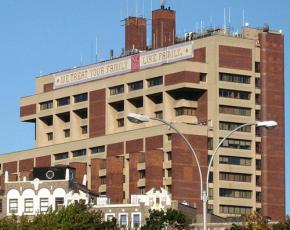Bronx mothers bear the brunt
The closure of neonatal and childbirth services at North Central Bronx Hospital is part of the chipping away of public health care, writes nurse and union activist .
LAST MONTH, without any notice to patients or health-care workers, all labor, delivery, nursery and neonatal services were hastily shut down at North Central Bronx Hospital (NCBH), part of the Health and Hospital Corporation (HHC), New York City's public hospital system.
On August 12, nurses, providers and other health-care workers were abruptly transferred to Jacobi Medical Center. Patients were also told that they should seek treatment at Jacobi, almost four miles away and difficult to access by public transportation.
The now-combined services at Jacobi have resulted in mass confusion, dangers to patients and a lower standard of care, according to nurses at the hospital. The newborn nursery and postpartum units are massively overcrowded. Obsolete six-bedded rooms have been reopened at Jacobi to warehouse families who have just given birth. Mothers are being separated from their children for up to 12 hours after birth because security systems for ensuring mother and child continuity and safety were not in place in the newly opened units.

"It gets very stressful, it's chaos," said nurse Sarita Jones, who works in the post-partum unit at Jacobi. "They're trying to act like they're managing it, but they're not."
Close to 1,500 babies were born at NCBH last year. This presents a crisis situation for Bronx parents who have relied on NCBH for readily accessible care at one of the most critical times in the life of any family--the impending birth of a child. This closure will require transporting people to a hospital miles away, thus adding crucial minutes to the trip--and possibly catastrophic consequences, especially when complications arise.
"Working class mothers will suffer the most because of this," said Jones. "This is an attack on lower-income and underserved neighborhoods."
Closing this unit also shuts down a major national center for midwifery and mother-centered childbirth practice. "Sadly, this closure marks the end of an award-winning, midwife-led program that has served some of New York City's most at-risk and underserved families for the last 36 years," read a petition initiated by the group Choices in Childbirth. "Despite the positive impact of the midwifery services at NCBH, HHC has consistently undermined the program."
City officials are claiming that they needed to consolidate services at the two hospitals to ensure patient safety. "This is a preemptive decision to ensure adequate staffing and a safe environment for the delivery of our patients' babies in the North Bronx," said Ana Marengo, an HHC spokesperson.
But if staffing were the issue, why not fix the problem instead of reduce services?
Many see this as further evidence of an accelerating trend of chipping away at public-sector health care in New York City. Already, dialysis units at HHC have been systematically privatized, starting with Bellevue Hospital, which was the largest facility. Nutrition, laundry and environmental services have also been sold off to private companies.
NCBH itself faced closure in 2006, but public pressure halted the process.
Thus far, two rallies have been held to protest the recent closing, one at NCBH on the day of the closure and one at Jacobi on September 4. Politicians have called for oversight hearings, but the 580 women formerly scheduled to give birth at NCBH in the next eight months can't wait that long.
Much more pressure needs to be brought on City Hall to support the New York State Nurses Association's call for a moratorium on the closure of hospitals and hospital services.
"If they can close these services at NCBH, what else can they do?" asked Jones.


